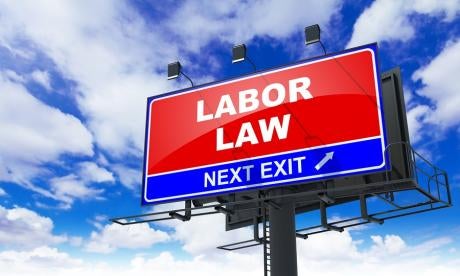The national labor relations act applies to non union companies
Legal Analysis. Expertly Written. Quickly Found.
Trending News
HB Ad Slot
HB Mobile Ad Slot


Email
414-239-6410
HB Ad Slot
In 2020, Resolve to Learn About the National Labor Relations Act
Thursday, January 2, 2020

Related Practices & Jurisdictions
- Labor Employment
- Administrative Regulatory
Some employers may think the National Labor Relations Act (NLRA) is a law that does not apply to them because their employees are not represented by unions. However, the NLRA’s coverage is much broader than just union relationships. Below are 10 reasons to resolve to learn more about the NLRA in 2020, even if your company is “union free.”
- An employee can have rights under the NLRA, regardless of whether the employee is a member of a union. Section 7 of the NLRA grants employees the right to engage in protected concerted activity. The National Labor Relations Board (NLRB), which is the federal agency that administers and enforces the NLRA, interprets these rights broadly to prohibit retaliation against an employee for taking action related to the terms and conditions of employment that actually or potentially affect other employees. Thus, an employee does not have to belong to or seek to join a union for Section 7 rights to apply.
- The NLRB is interested in employment policies and practices. Two examples of nonunion issues that the NLRB investigates are (1) discipline over social media activity and (2) employee handbook policies that purportedly chill employee Section 7 activity. It can be useful to pay close attention to rights and restrictions under the NLRA when creating workplace policies or making employment decisions.
- Unfair labor practice charges can appear overwhelming. When an employee or union alleges that an employer violated the NLRA, the employer will receive a notice of an unfair labor practice (ULP) charge. The ULP notice directs the employer to provide a significant amount of information, documents, and even witnesses. However, not everything that the NLRB initially demands may need to be provided, and experienced counsel can help guide employers through the process.
- Other government agencies refer employees to the NLRB. Though no official statistics are available, lawyers practicing in labor law have observed that the U.S. Equal Employment Opportunity Commission and other government agencies experiencing backlogs in the claims they receive are referring employees to the NLRB for potentially faster claim processing and relief. Even if they may be unaware of the NLRA, your former employees may be referred to the NLRB to file complaints.
- The union election process happens quickly. For an unsuspecting employer, a petition filed by a union to hold an election may come as a surprise. Prior to the election, the employer must address procedural issues with the NLRB and communicate on the substantive issues with employees about the election. The time to respond is short, and preparation is essential.
- Union elections can be difficult to win. On average, unions win approximately 70 percent of the elections that are held. But it may never come to that. Workforces where employees are respected, valued, and heard are less likely to get to the point of holding union elections.
- Employers have rights. Recently, the NLRB has issued key rulings that have increased employer rights under the NLRA. For example, employers now may exclude nonemployee union organizers from employer property, which they could not do before 2019. Employers familiar with the NLRA and recent case developments are more likely to enforce their rights.
- Supervisors’ conduct can violate the NLRA. The NLRA generally holds supervisors to the same restrictions regarding employee communication that bind high-ranking managers. If supervisors are not trained regarding what they can and cannot discuss with employees, their mistakes may become the employer’s violation of law.
- The NLRA is constantly evolving. The NLRB modifies and even reverses its controlling interpretations of the NLRA with changes in its membership. The NLRB is made up of five members who serve staggered four-year terms. These are political appointees, and the political party of the presidency enjoys majority representation on the Board. Regular changes in the NLRB’s membership often lead to significant changes in the law that employers must follow.
- Labor reform will be a major topic in the 2020 election. On May 2, 2019, Democratic members of Congress introduced the Protecting the Right to Organize Act, or PRO Act. Many of the Democratic presidential candidates have expressed support for the PRO Act. This legislation, which may divide the candidates and is likely to divide the parties, will receive significant attention as the campaigns continue.
© 2024, Ogletree, Deakins, Nash, Smoak & Stewart, P.C., All Rights Reserved.
Current Public Notices
Published: 17 September, 2024
Published: 16 September, 2024
Published: 10 September, 2024
Published: 4 September, 2024
Published: 30 August, 2024
Published: 30 August, 2024
HB Ad Slot
HB Mobile Ad Slot
Current Legal Analysis
HB Ad Slot
HB Mobile Ad Slot
More from Ogletree, Deakins, Nash, Smoak & Stewart, P.C.
Upcoming Legal Education Events



 Regulatory Compliance Attorneys" width="175" height="175" />
Regulatory Compliance Attorneys" width="175" height="175" />
HB Ad Slot
HB Mobile Ad Slot
We collaborate with the world's leading lawyers to deliver news tailored for you. Sign Up to receive our free e-Newsbulletins
Legal Disclaimer
You are responsible for reading, understanding, and agreeing to the National Law Review's (NLR’s) and the National Law Forum LLC's Terms of Use and Privacy Policy before using the National Law Review website. The National Law Review is a free-to-use, no-log-in database of legal and business articles. The content and links on www.NatLawReview.com are intended for general information purposes only. Any legal analysis, legislative updates, or other content and links should not be construed as legal or professional advice or a substitute for such advice. No attorney-client or confidential relationship is formed by the transmission of information between you and the National Law Review website or any of the law firms, attorneys, or other professionals or organizations who include content on the National Law Review website. If you require legal or professional advice, kindly contact an attorney or other suitable professional advisor.
Some states have laws and ethical rules regarding solicitation and advertisement practices by attorneys and/or other professionals. The National Law Review is not a law firm nor is www.NatLawReview.com intended to be a referral service for attorneys and/or other professionals. The NLR does not wish, nor does it intend, to solicit the business of anyone or to refer anyone to an attorney or other professional. NLR does not answer legal questions nor will we refer you to an attorney or other professional if you request such information from us.
Under certain state laws, the following statements may be required on this website and we have included them in order to be in full compliance with these rules. The choice of a lawyer or other professional is an important decision and should not be based solely upon advertisements. Attorney Advertising Notice: Prior results do not guarantee a similar outcome. Statement in compliance with Texas Rules of Professional Conduct. Unless otherwise noted, attorneys are not certified by the Texas Board of Legal Specialization, nor can NLR attest to the accuracy of any notation of Legal Specialization or other Professional Credentials.
The National Law Review - National Law Forum LLC 2070 Green Bay Rd., Suite 178, Highland Park, IL 60035 Telephone (708) 357-3317 or toll-free (877) 357-3317. If you would like to contact us via email please click here.
Copyright ©2024 National Law Forum, LLC




![]()
![]()

Regulatory Compliance Attorneys" width="175" height="175" />